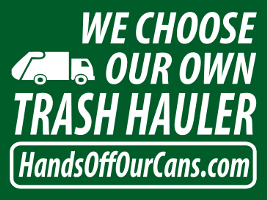Garbage In, Government Out? Residents Challenge Bloomington Garbage System
Garbage in, government out? The Ramsey County District Court ruling in favor of St. Paul residents who petitioned the city for the right to vote on how their garbage gets picked up dominated Twin Cities news coverage last week.
The court ruled the city illegally rejected a petition signed by thousands of citizens to force a referendum on whether to let citizens choose their trash hauler or to go with the controversial organized garbage collection already imposed on them by the city.
RELATED: MN High Court Rules for Citizens Fighting Bloomington on Garbage
But there’s another case involving the city of Bloomington thwarting the will of its residents over forced garbage collection being handled by the same attorney. It’s teed up to go before the Minnesota Supreme Court next Wednesday.
“Really the crux of it is the same, which is that both groups of people commended petitions to their respective city councils, both petitions were recognized as sufficient and both were rejected,” attorney Greg Joseph told American Experiment.
The specifics may differ with the question in St. Paul focusing on a ballot referendum and the issue in Bloomington focusing on a charter amendment going before voters. But Joseph maintains the same principle lies at the heart of both cases, which reinforce the right of citizens of home rule charter cities to petition local authorities to change policies.
“The point is no matter how you feel about the actual policy of organized collection, this is about the right of the people to choose whether they want it or not,” Joseph said. “No one has the right to deny charter rights reserved for voters. The city council doesn’t get to not do it just because it’s inconvenient.”
The Minnesota Supreme Court has already ruled that the city of Bloomington improperly rejected the residents’ petition. Now the high court will consider the wording of the residents’ referendum and the constitutionality of the residents’ proposed charter amendment.
Yet it seems likely that the organized garbage collection policies imposed by officials on the residents of two of Minnesota’s biggest cities will be on the ballot this fall. Regardless of whether citizens vote for organized garbage collection or not, Minnesotans’ right to be heard on issues of local importance will be the winner.